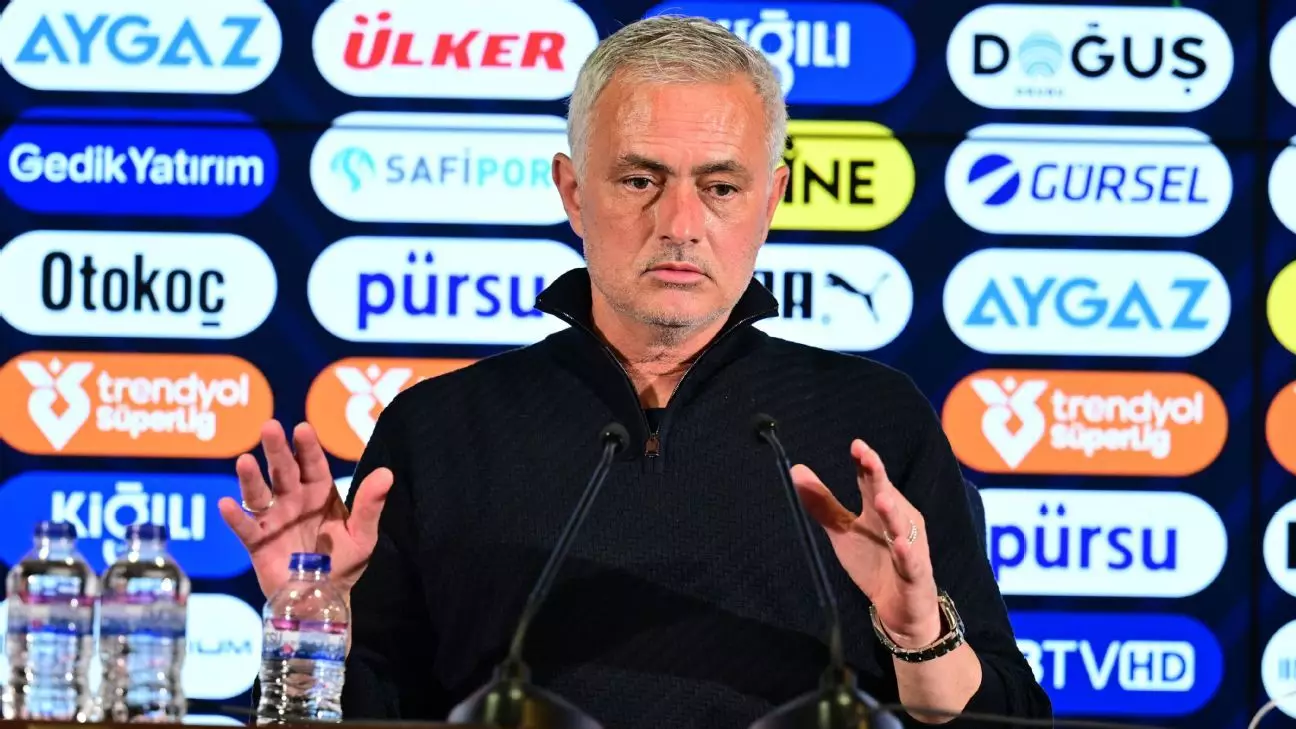In a stunning display of competitive tension, Fenerbahce’s head coach José Mourinho finds himself perched on a precarious ledge after a bitter 1-0 defeat to bitter rivals Besiktas. This loss not only leaves Fenerbahce languishing in second place but also positions them a daunting eight points behind Galatasaray, the current Super Lig leaders. With just four games left in the season, the bleak prospects seem to raise more questions than answers, particularly regarding Mourinho’s long-term commitment to the club he joined under a two-year contract merely last summer. The overarching narrative of Fenerbahce’s campaign speaks volumes about the pressures of modern football where success is often measured in terms of silverware rather than a gradual rebuilding process.
The Mourinho Dilemma
Mourinho’s post-match comments reflect a coach who is increasingly aware of the immense pressure surrounding him. He shied away from discussing next season, opting instead to emphasize his respect for the club’s internal processes. “If there is something where I’ve been absolutely perfect is on my respect towards my club president,” he asserted, highlighting the need for discretion in turbulent times. This approach is indicative of Mourinho’s tactical nature; he knows very well that in the world of football, loyalty is often questioned and scrutinized, particularly when performances do not match expectations.
However, the question looms larger than life: Can Mourinho turn things around in a league that he has painted as “toxic”? His assertions that the environment within the Super Lig is rife with favoritism have caused ripples throughout the Turkish football community. This ongoing narrative of systemic bias raises intriguing questions about the club’s competitiveness and the challenges that come with it. In a league where public sentiment and media coverage can shift like the wind, Mourinho’s candor may further complicate his standing among fans and decision-makers alike.
Reflecting on Rivalries
When queried about Galatasaray’s impressive trajectory, Mourinho deftly sidestepped the topic, focusing instead on the overall championship rather than engaging in a war of words with a city rival. His reluctance to pour salt into the wounds of rivalry reveals a tactical mindset aimed at maintaining focus where it counts—on his team’s performance rather than getting mired in side controversies. What’s fascinating is his acknowledgment of the underlying “system” affecting Fenerbahce’s operations. By stating that the psychological pressures are “stronger than the quality,” he sheds light on the invisible struggles affecting not only his players but the essence of the club itself.
His inability to clinch victories against both Galatasaray and Besiktas this season magnifies the urgency of his position. Fans, with their unwavering loyalty, have every right to voice discontent when performances fall short. Mourinho accepts this scrutiny, suggesting that it’s a natural reaction rooted in the culture of football where expectations are sky-high. This acceptance not only showcases a level of humility but also emphasizes his understanding of the weight his title carries.
Advice Amidst the Chaos
The mention of Ole Gunnar Solskjær, who took charge of Besiktas in January, offers an interesting side narrative. Mourinho’s refusal to offer unsolicited advice speaks to a mutual respect between seasoned managers, both navigating unique challenges in a landscape fraught with its own complexities. New managers must learn to read the realities on the ground, particularly in a league known for its dramatic shifts in momentum. Mourinho’s refusal to gloat or lament reflects his grasp of the fragility that dictates the careers of coaches and players alike.
This nuanced relationship within football’s upper echelons illustrates the differences between immediate success and the long road to recovery. As the season wanes, Mourinho stands not only as a coach but as a strategist, tackling not just the tactical but also the socio-political facets of football in Turkey. His journey at Fenerbahce so far has been characterized by a blend of ambition, complexity, and unfathomable pressure, showcasing a facet of the beautiful game that often remains in the shadows. The coming weeks will undoubtedly be pivotal—not just for Fenerbahce and Mourinho himself, but for the broader narrative of a league wrestling with its own identity amidst high stakes and expectations.


Leave a Reply